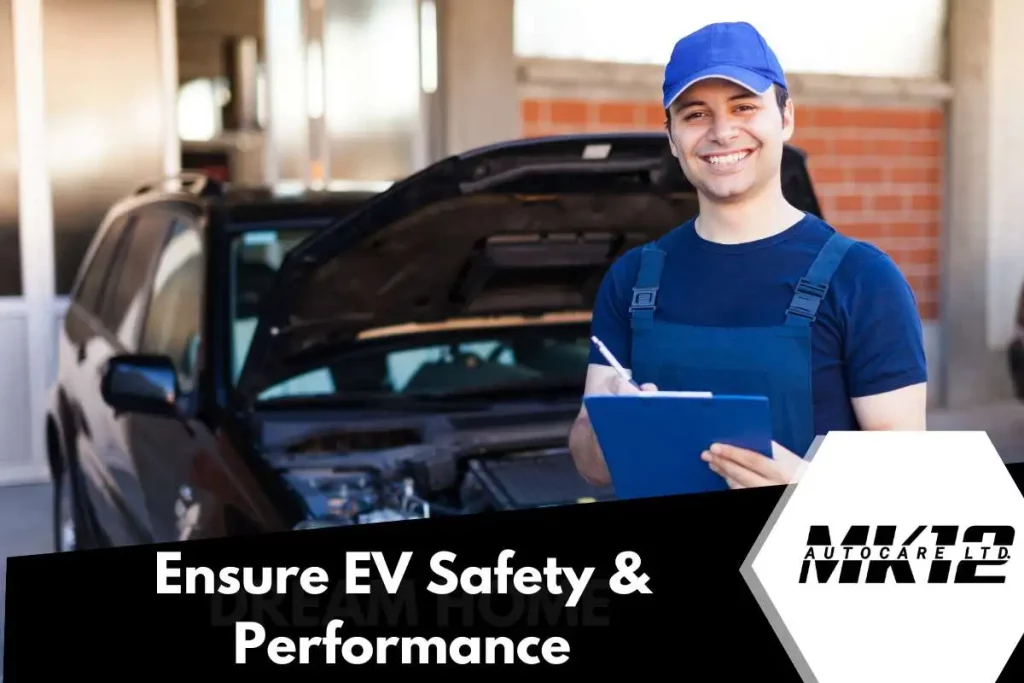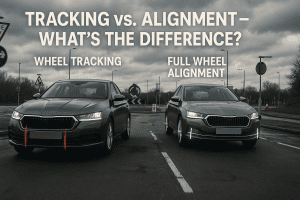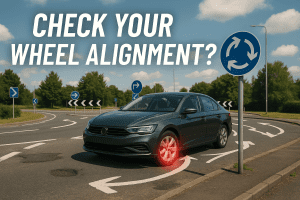
Before a vehicle hits the open road, it undergoes a Ministry of Transport (MOT) test – like a thorough health check for cars. This isn’t just another bureaucratic step; it’s a vital process. This is guarantees your safety on the road. The MOT test, mandatory in many countries. Focuses on ensuring vehicles are roadworthy and safe. It’s like a guardian angel for both drivers and pedestrians.
For years, this test has kept our roads safe by catching potential hazards: faulty brakes, dim lights, or shaky steering. Now, The advent of electric vehicles . The MOT test is evolving to embrace cutting-edge technology. EVs bring unique features, and the MOT ensures their battery, powertrain, and advanced systems are up to par. This way, the trusty MOT test continues to be a crucial checkpoint, adapting to keep pace. With innovation and offering us peace of mind as we cruise into the future.
Understanding MOT Testing for Electric Vehicles:
Exploring EV MOT Testing: This overview delves into the specialized world of MOT testing for electric vehicles. From battery assessments to high-voltage inspections. It unveils the process ensuring EV safety and roadworthiness. Here must be Addressing unique challenges and evolving regulations, Today i will present on this article about MOT testing’s vital role in keeping electric vehicles reliable and secure on the road.
The Purpose of MOT Testing:
MOT testing serves as a critical safety net, aimed at guaranteeing vehicles adhere to rigorous safety, environmental, and roadworthiness benchmarks. At its core, the primary goal of MOT testing is to ensure that vehicles.Including the burgeoning realm of electric vehicles (EVs), remain safe for both their occupants and fellow road users.
This meticulous examination plays a pivotal role in unearthing potential hazards and defect. By meticulously scrutinizing various vehicle components, MOT tests unveil any lurking mechanical, electrical, or functional irregularities. Its thereby preventing potential accidents or breakdowns. For electric vehicles, this is especially vital due to the unique intricacies of their systems.
In essence, MOT testing stands as a cornerstone of road safety. Its standing guard against unforeseen dangers and maintaining a standard of excellenc.For That echoes in every hum of an electric motor or rev of a combustion engine.
EV-Specific Components Subject to Testing:
In the world of electric vehicles (EVs), a symphony of cutting-edge components harmoniously propels these eco-friendly marvels forward. However, their intricate nature warrants specialized scrutiny within the MOT testing process. Here, we think into the electric heartbeat of these vehicles, spotlighting the critical components subjected to rigorous evaluation:
Battery and Powertrain:
At the heart of any EV lies its power core: the battery and powertrain. MOT tests meticulously gauge battery performance, capacity, and safety mechanisms. By ensuring these vital components meet stringent standards, the test safeguards against potential hazards and ensures optimal efficiency on the road.
Charging System:
Charging ports, cables, and their counterparts come under the spotlight during testing. This inspection guarantees that the lifelines of EVs, their charging infrastructure, remain in pristine condition, facilitating smooth and secure charging experiences.
Electric Motors:
The driving force behind electric motors, undergo thorough assessment. Motor efficiency, overall performance, and the cooling systems that preserve their health are meticulously inspected, contributing to the vehicle’s seamless operation and longevity.
Regenerative Braking:
A hallmark of electric vehicles, regenerative braking systems enable energy recapture. MOT tests scrutinize these systems to ensure their proper functionality, maximizing energy efficiency and enhancing overall driving dynamics.
Onboard Electronics:
The intricate web of onboard electronics, including control systems, sensors, and communication interfaces, are subjected to meticulous evaluation. These interconnected components contribute to the vehicle’s intelligence and safety, warranting thorough checks to guarantee their seamless operation.
In the realm of electric vehicles, MOT testing assumes an even more critical role, fostering the reliability and safety that define modern transportation. Through precise evaluation of these EV-specific components, MOT testing serves as a vigilant guardian, ensuring that the advanced technologies propelling electric vehicles forward remain in perfect harmony.
Challenges and Considerations:
As electric vehicles (EVs) redefine the automotive landscape, their distinctive features bring both innovation and novel challenges to the forefront of MOT testing. Delving into the unique characteristics of EVs, we uncover the considerations that demand specialized attention during the testing process:
Silent Operation and Pedestrian Safety:
The hushed propulsion of EVs, while eco-conscious and serene, poses a concern for pedestrian safety. The lack of traditional engine noise requires MOT tests to explore alternative methods to ensure pedestrians are alerted to the presence of these nearly-silent vehicles, preserving the safety of all road users.
High Voltage Systems and Tester Precautions:
EVs thrive on high voltage, ushering in unparalleled power. Yet, this innovation necessitates rigorous precautions during MOT testing. Testers undergo specialized training to safely handle high voltage components, employing protective gear and protocols that underscore their commitment to safety.
Battery Health and Degradation Impact:
While batteries are the lifeblood of EVs, their health and capacity degrade over time. This battery degradation reality influences MOT testing. Evaluations consider factors like charging patterns, battery management systems, and overall capacity, ensuring that a vehicle’s power source meets requisite standards for both safety and functionality.
In the dynamic world of EVs, the MOT testing process evolves to accommodate these distinctive attributes. Beyond conventional considerations, these tests become a means to embrace the innovation of electric mobility while upholding the paramount importance of safety, environmental consciousness, and performance.
Training and Equipment for Testers:
In the realm of electric vehicles (EVs), the evolution of automotive technology demands a parallel evolution in the expertise of MOT testers. As these modern marvels find their place on the roads. The specialized training and equipment required for MOT testers become paramount:
Specialized Training on EV Technology and Safety Protocols: The intricacies of EVs require MOT testers to undergo specialized training. That delves into the nuances of electric propulsion, high voltage systems, and unique components. This knowledge equips testers with a deep understanding of EV intricacies. Enabling them to effectively evaluate the safety, performance, and compliance of these vehicles.
Safety Equipment for Handling EV Components: The heart of an EV beats with high voltage, underscoring the need for meticulous precautions. MOT testers are outfitted with safety gear. Its includes insulated gloves, protective clothing, and non-conductive tools. These essential safeguards shield testers from potential hazards while working with high voltage components. Its reflecting the commitment to both vehicle integrity and personnel well-being.
As EVs mark a new chapter in automotive history. Its the role of MOT testers takes on fresh significance. Through ongoing training and the provision of advanced safety equipment. These professionals are primed to confidently navigate the complexities of electric mobility. Their expertise ensures that the roadworthiness and safety of electric vehicles align with the innovative strides taken by the automotive industry.
MOT Testing for Electric Vehicles Procedure
In the journey towards an MOT test for electric vehicles (EVs), a pivotal pre-test phase ensures meticulous assessment accuracy. We delve into the crucial steps taken to prepare EVs for their MOT examinations:
Battery Charging:
Fueling the Examination: Charging the EV’s battery before the test isn’t merely routine; it’s an essential prerequisite. A fully charged battery ensures optimal operation of the vehicle’s systems and components. This enables a thorough evaluation of performance, efficiency, and safety measures. The battery’s charge level significantly influences system functionality, and a well-charged battery guarantees a precise evaluation of the vehicle’s capabilities.
Diagnostic Readiness:
EVs feature advanced onboard diagnostics systems that monitor and report various facets of vehicle operation. Ahead of the MOT test, these systems require preparation. Ensuring onboard diagnostics readiness involves confirming the correct functioning of sensors, control modules, and communication interfaces. This step empowers testers to access the vehicle’s digital intelligence, unveiling potential issues that might not be immediately apparent.
In the world of electric vehicles, meticulous pre-test preparation stands as the cornerstone of a successful MOT examination. By tending to battery charging and priming onboard diagnostics systems, this phase assures that the ensuing assessment truly mirrors the EV’s capabilities, safety provisions, and overall roadworthiness.
Testing Phases: Ensuring EV Excellence on the Road
During the MOT testing phases for electric vehicles (EVs), a meticulous process unfolds to ensure their safety and roadworthiness. Here’s a concise overview of the key steps taken during these phases:
Functional Checks:
In this stage, a comprehensive examination of various systems takes place. This includes scrutinizing lights, brakes, and steering mechanisms to guarantee their optimal operation. These checks address critical safety aspects, ensuring the vehicle’s readiness for varied road conditions.
Battery Health and Capacity:
The battery, the life force of an EV, undergoes in-depth evaluation. Both its performance and health are carefully examined. This entails assessing its capacity to deliver power and its overall health over time. These evaluations ensure the battery remains dependable and up to standard.
High Voltage System Inspection:
The high voltage components that empower EVs receive special attention. Rigorous safety steps are implemented during this inspection to safeguard both testers and the vehicle. Ensuring the correct functioning of high voltage systems guarantees their secure integration into the vehicle’s operation.
Emissions and Environmental Standards:
EVs play a pivotal role in reducing emissions and upholding environmental standards. This phase highlights their contribution to a cleaner environment by producing fewer emissions compared to traditional vehicles. Their adherence to stringent emissions and environmental regulations underscores their eco-friendly impact.
As EVs transform the automotive landscape, MOT testing phases adapt to their unique attributes. By addressing functional aspects, battery health, safety measures, and environmental impact, these testing phases ensure that electric vehicles adhere to the highest standards of safety, performance, and sustainability.
Post-Test Assessment: Documenting, Advising, and Repairing
Following the comprehensive MOT test for electric vehicles (EVs), the post-test assessment phase concludes the examination process. Here’s a concise overview of how the results are managed and communicated to vehicle owners:
Evaluation Report:
The outcomes of the EV MOT test are meticulously documented in an evaluation report. This comprehensive report summarizes the findings of each assessment category, shedding light on the vehicle’s performance, safety measures, and overall roadworthiness. The report acts as a comprehensive record, ensuring transparency and accountability.
Recommendations and Repairs:
The evaluation report doesn’t just stop at findings; it offers actionable insights. Depending on the test results, recommendations may be provided to vehicle owners, highlighting areas that may require attention or improvements. These recommendations can range from minor adjustments to more substantial repairs. This phase empowers vehicle owners with information to enhance their EV’s performance and safety.
In the realm of EV MOT testing, the post-test assessment phase goes beyond mere results, providing a roadmap for vehicle owners to ensure their EV’s ongoing reliability. Through clear documentation, tailored recommendations, and potential repair guidance, this phase contributes to the holistic maintenance of electric vehicles, fostering their safety, efficiency, and overall excellence on the road.
Regulatory Updates and Future Outlook
Evolving Regulations: Navigating the Future of EV MOT Testing
The landscape of MOT testing for electric vehicles (EVs) is undergoing a transformative shift, both in response to existing developments and the anticipation of future advancements. Here’s a glimpse into the dynamic realm of evolving regulations and their significance:
Adapting to Technological Advancements:
As electric mobility evolves, so must the regulations that govern MOT testing. The rapid pace of technological innovation within EVs demands regulations that are agile and responsive. From regenerative braking systems to advanced onboard electronics, the intricate technology within EVs necessitates updated standards that reflect the cutting-edge capabilities of these vehicles.
Anticipated Changes:
Foreseeing the path ahead, regulators are actively shaping the future of EV MOT testing. Anticipated changes might involve nuanced assessments for autonomous driving features, addressing the synergy between technology and vehicle safety. Additionally, the evolution of battery technology and charging infrastructure could lead to adjustments in testing criteria, ensuring that EVs continue to meet evolving benchmarks.
Importance of Flexibility:
As technology continues to redefine transportation, the importance of flexible regulations cannot be overstated. The adaptability of MOT testing standards ensures that safety, environmental, and roadworthiness criteria remain robust even as vehicles become smarter, more efficient, and more complex.
Integration of Autonomous Features: Shaping the Future of EV MOT Testing
The horizon of EV MOT testing is expanding, with discussions surrounding the integration of assessments for autonomous driving features. Here’s a glimpse into the potential and challenges of ushering these advanced technologies into the realm of MOT testing:
Potential Inclusion of Assessments:
The future holds the promise of EVs equipped with autonomous driving features, heralding a transformative era in transportation. This evolution prompts the consideration of including assessments for these features within the MOT testing framework. Ensuring the safe and reliable operation of autonomous capabilities aligns with the core purpose of MOT testing – verifying roadworthiness and safety.
Challenges:
Integrating assessments for autonomous features introduces a new dimension of complexity. Evaluating the accuracy, responsiveness, and fail-safe mechanisms of autonomous systems poses challenges in simulation and real-world scenarios. Ensuring consistent testing standards across diverse autonomous technologies is a formidable task that requires ongoing adaptation.
Benefits:
Evaluating autonomous driving features within MOT testing could lead to safer roads by setting standards for these cutting-edge capabilities. Testing can uncover vulnerabilities, prompting refinements that enhance both autonomous performance and overall vehicle safety. Additionally, MOT assessments encourage the continuous improvement of autonomous technologies, fostering consumer trust in their reliability.
Conclusion:
In the realm of electric vehicles (EVs), MOT testing emerges as a vital guardian. From battery prowess to emissions compliance, the thorough assessment of EV components ensures their safety and performance. This intricate testing process stands as an unwavering assurance, adapting to embrace technological strides. As EVs evolve and autonomous capabilities emerge, MOT testing remains steadfast in its commitment to secure and roadworthy electric mobility. In a landscape marked by change, MOT testing’s constant evolution echoes the dynamism of electric vehicle technology, underscoring its indispensable role in shaping the roads of tomorrow. By the way if you want to test your MOT in Milton Keynes. MK12 Autocare Ltd is the best MOT Test Service Centre In Mitlon Keynes






